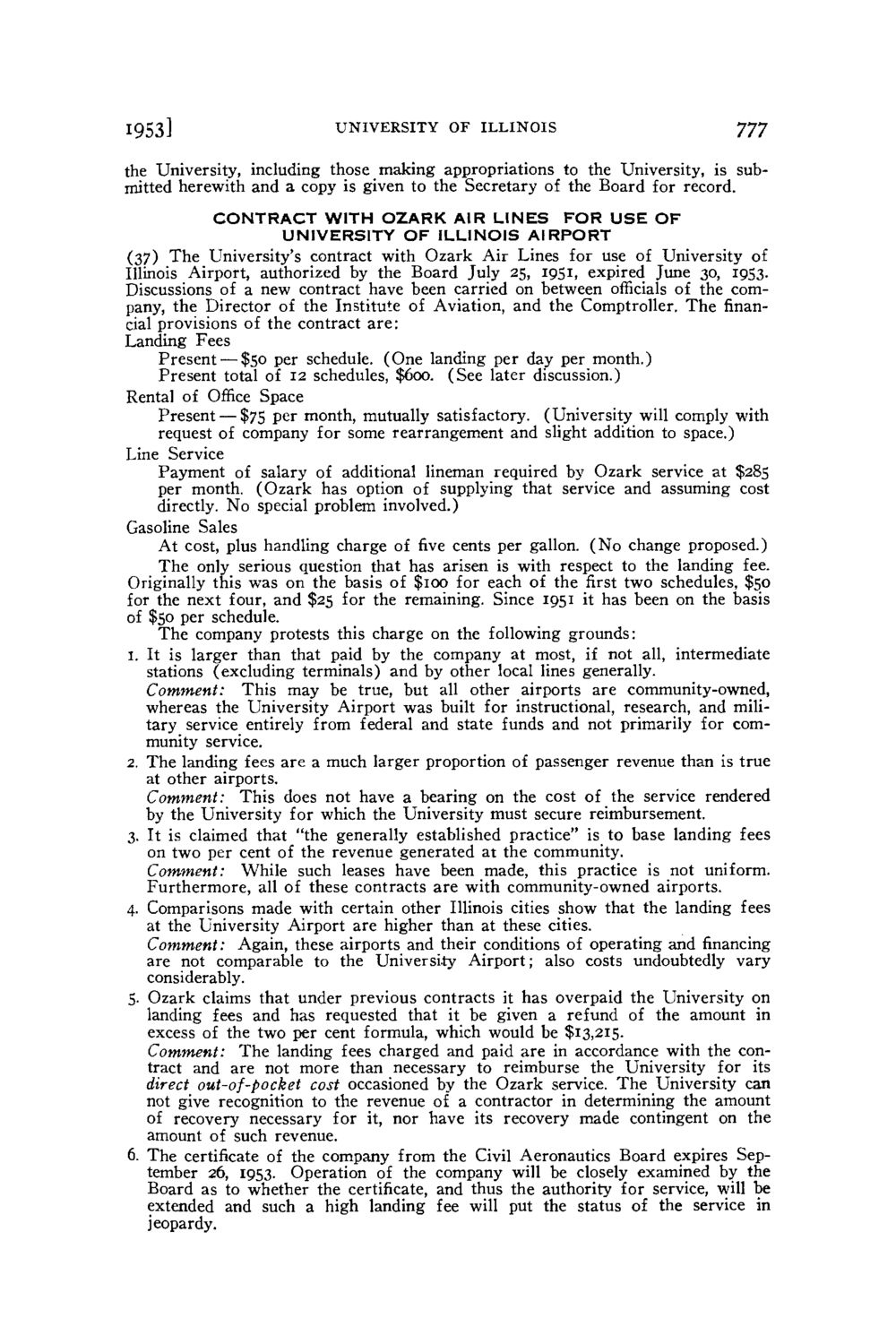| |
| |
Caption: Board of Trustees Minutes - 1954
This is a reduced-resolution page image for fast online browsing.

EXTRACTED TEXT FROM PAGE:
1953] UNIVERSITY OF ILLINOIS 777 the University, including those making appropriations to the University, is submitted herewith and a copy is given to the Secretary of the Board for record. CONTRACT WITH OZARK AIR LINES FOR USE OF UNIVERSITY OF ILLINOIS AIRPORT (37) The University's contract with Ozark Air Lines for use of University of Illinois Airport, authorized by the Board July 25, 1951, expired June 30, 1953. Discussions of a new contract have been carried on between officials of the company, the Director of the Institute of Aviation, and the Comptroller. The financial provisions of the contract a r e : Landing Fees Present-—$50 per schedule. (One landing per day per month.) Present total of 12 schedules, $600. (See later discussion.) Rental of Office Space Present — $75 per month, mutually satisfactory. (University will comply with request of company for some rearrangement and slight addition to space.) Line Service Payment of salary of additional lineman required by Ozark service at $285 per month. (Ozark has option of supplying that service and assuming cost directly. No special problem involved.) Gasoline Sales At cost, plus handling charge of five cents per gallon. ( N o change proposed.) The only serious question that has arisen is with respect to the landing fee. Originally this was on the basis of $100 for each of the first two schedules, $50 for the next four, and $25 for the remaining. Since 1951 it has been on the basis of $50 per schedule. The company protests this charge on the following grounds: 1. It is larger than that paid by the company at most, if not all, intermediate stations (excluding terminals) and by other local lines generally. Comment: This may be true, but all other airports are community-owned, whereas the University Airport was built for instructional, research, and military service entirely from federal and state funds and not primarily for community service. 2. The landing fees are a much larger proportion of passenger revenue than is true at other airports. Comment: This does not have a bearing on the cost of the service rendered by the University for which the University must secure reimbursement. 3. It is claimed that "the generally established practice" is to base landing fees on two per cent of the revenue generated at the community. Comment: While such leases have been made, this practice is not uniform. Furthermore, all of these contracts are with community-owned airports. 4. Comparisons made with certain other Illinois cities show that the landing fees at the University Airport are higher than at these cities. Comment: Again, these airports and their conditions of operating and financing are not comparable to the University Airport; also costs undoubtedly vary considerably. 5. Ozark claims that under previous contracts it has overpaid the University on landing fees and has requested that it be given a refund of the amount in excess of the two per cent formula, which would be $13,215. Comment: The landing fees charged and paid are in accordance with the contract and are not more than necessary to reimburse the University for its direct out-of-pocket cost occasioned by the Ozark service. The University can not give recognition to the revenue of a contractor in determining the amount of recovery necessary for it, nor have its recovery made contingent on the amount of such revenue. 6. The certificate of the company from the Civil Aeronautics Board expires September 26, 1953. Operation of the company will be closely examined by the Board as to whether the certificate, and thus the authority for service, will be extended and such a high landing fee will put the status of the service in jeopardy.
| |